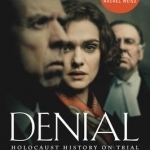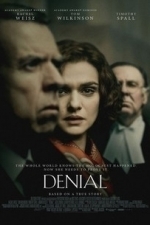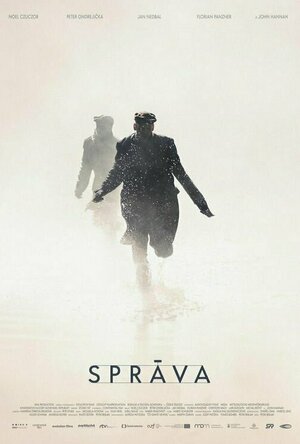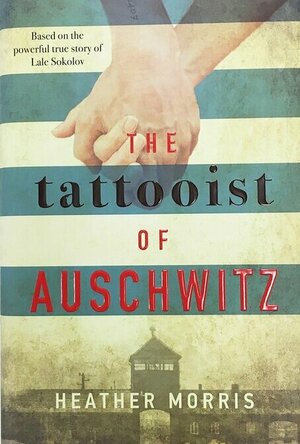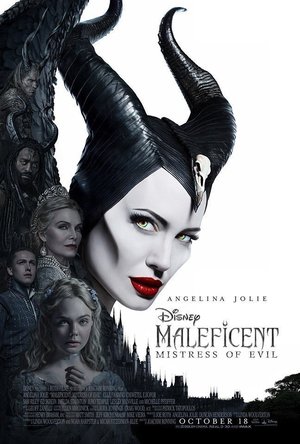Search
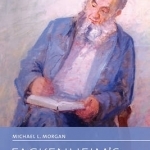
Fackenheim's Jewish Philosophy: An Introduction
Book
Emil L. Fackenheim, one of the most significant Jewish thinkers of the twentieth century, is best...
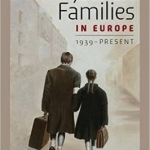
Jewish Families in Europe, 1939-Present: History, Representation, and Memory
Book
This book offers an extensive introduction and 14 diverse essays on how World War II, the Holocaust,...
Suswatibasu (1703 KP) rated Man's Search for Meaning: The Classic Tribute to Hope from the Holocaust in Books
Sep 15, 2017
Harrowing and important
I wish I concentrated on this more. There are some very important and valid points Viktor Frankl makes, especially given the author is also a psychiatrist and a survivor of the Holocaust. It is extremely traumatic and harrowing hearing his experiences in several concentration camps, and how he changed his attitude in order to stay alive.
Frankl concludes that man's search for purpose and meaning in life gives his ability to survive.
Frankl concludes that man's search for purpose and meaning in life gives his ability to survive.
Erika (17789 KP) rated Denial: Holocaust History on Trial in Books
Sep 16, 2017
This book was so readable and completely interesting. Of course, I saw the movie first, and as is the case with most, I prefer the book now. I'm not particularly well versed in the Holocaust, so I was glad with the amount of history she included, as this was, history on trial. I was glad I ended up reading the book. IMO the Plaintiff is completely revolting and makes my skin crawl.
Darren (1599 KP) rated Denial (2016) in Movies
Dec 28, 2019
Verdict: Interesting Courtroom Drama
Story: Denial starts when acclaimed writer and historian Deborah Lipstadt (Weisz) has her latest book about the horrors of the Holocaust being released, only her in her book to slams historian and renowned denier David Irving (Spall). David Irving has built up a reputation for being able to fight his case and decides to sue Deborah for libel.
After the years or preparation Deborah watches how Anthony Julius (Scott) and Richard Rampton (Wilkinson) look to make a trial where Deborah will win, without having to put the holocaust on trial, they want to keep it together for argument, with the case being about proving David’s research, rather than whether the holocaust happened.
Thoughts on Denial
Characters – Deborah Lipstadt is an acclaimed author that has made her career out of writing about the horrors around the holocaust, this has created an enemy in David Irving, that she has always been denying the holocaust happened. She must defend her own accusation against him, putting her trust in a group of lawyers to fight the case, despite the fact she would like to put the spotlight on the events, over the facts being disputed. Richard Rampton is the lawyer that is running the case in the courtroom, he has methods that Deborah doesn’t like, until she sees how he has truly been planning the case. Anthony Julius runs the case behind the scenes, he has a huge reputation with his previous work which made headlines and must be strict towards Deborah over what she wants to happen in the case. David Irving is the famous Holocaust denier, he has made a career out of his theories, which has given him a huge following, he decides to sue Deborah for criticising his beliefs, where he uses his natural charisma to get people behind him, despite his anti-Semitic behaviour being clear to see.
Performances – Rachel Weisz in the leading role is great to see, she shows just how helpless Deborah looks during the case, that puts her own reputation on the line. Timothy Spall steals the show with his depiction of David Irving, showing how he is the more colourful character in the case. Tom Wilkinson shows he will always be able to bring a quiet character to life in the moments he needs to shine, while Andrew Scott proves that his rising star will get involved in the major performances.
Story – The story here follows Deborah Lipstadt who has her own book sued for libel by holocaust denier David Irving, forcing them into a court case, which will be about whether he has been making up the truth for his own benefit or whether she had the right to question his beliefs. The story is an interesting one to follow, seeing an conspiracy theorist being put in a courtroom to prove his fictional story about the truth is fascinating to see, having a court case just about whether something as horrific as the holocaust is bad enough, but seeing how everybody seemed to have a fine balance between who could win, was also interesting. The story does struggling to start with, because of the large number of time jumps, with it starting in 1994, before the case happening in 2000, with small scenes in the build up to the case, through the years, but once we get into the courtroom, we are grasp by the story.
Biopic – The biopic side of the story focuses more on the case, rather than the people involved, which could take away just how much the case did take out of the people involved.
Settings – The film does use the courtroom as the main location for the story to move forward, with most of the external locations being ideas of where the story could end up going, with most being office, apart from the haunting trip to Auschwitz.
Scene of the Movie – The court case.
That Moment That Annoyed Me – The early time jumps, we seem to have one scene, then jump two more years down the line.
Final Thoughts – This is an interesting courtroom drama, that shows how the truth managed to get all the way to a courtroom, when it was clear it happened, showing even conspiracy theorist could challenge the truth.
Overall: Interesting, but not Intense drama.
Story: Denial starts when acclaimed writer and historian Deborah Lipstadt (Weisz) has her latest book about the horrors of the Holocaust being released, only her in her book to slams historian and renowned denier David Irving (Spall). David Irving has built up a reputation for being able to fight his case and decides to sue Deborah for libel.
After the years or preparation Deborah watches how Anthony Julius (Scott) and Richard Rampton (Wilkinson) look to make a trial where Deborah will win, without having to put the holocaust on trial, they want to keep it together for argument, with the case being about proving David’s research, rather than whether the holocaust happened.
Thoughts on Denial
Characters – Deborah Lipstadt is an acclaimed author that has made her career out of writing about the horrors around the holocaust, this has created an enemy in David Irving, that she has always been denying the holocaust happened. She must defend her own accusation against him, putting her trust in a group of lawyers to fight the case, despite the fact she would like to put the spotlight on the events, over the facts being disputed. Richard Rampton is the lawyer that is running the case in the courtroom, he has methods that Deborah doesn’t like, until she sees how he has truly been planning the case. Anthony Julius runs the case behind the scenes, he has a huge reputation with his previous work which made headlines and must be strict towards Deborah over what she wants to happen in the case. David Irving is the famous Holocaust denier, he has made a career out of his theories, which has given him a huge following, he decides to sue Deborah for criticising his beliefs, where he uses his natural charisma to get people behind him, despite his anti-Semitic behaviour being clear to see.
Performances – Rachel Weisz in the leading role is great to see, she shows just how helpless Deborah looks during the case, that puts her own reputation on the line. Timothy Spall steals the show with his depiction of David Irving, showing how he is the more colourful character in the case. Tom Wilkinson shows he will always be able to bring a quiet character to life in the moments he needs to shine, while Andrew Scott proves that his rising star will get involved in the major performances.
Story – The story here follows Deborah Lipstadt who has her own book sued for libel by holocaust denier David Irving, forcing them into a court case, which will be about whether he has been making up the truth for his own benefit or whether she had the right to question his beliefs. The story is an interesting one to follow, seeing an conspiracy theorist being put in a courtroom to prove his fictional story about the truth is fascinating to see, having a court case just about whether something as horrific as the holocaust is bad enough, but seeing how everybody seemed to have a fine balance between who could win, was also interesting. The story does struggling to start with, because of the large number of time jumps, with it starting in 1994, before the case happening in 2000, with small scenes in the build up to the case, through the years, but once we get into the courtroom, we are grasp by the story.
Biopic – The biopic side of the story focuses more on the case, rather than the people involved, which could take away just how much the case did take out of the people involved.
Settings – The film does use the courtroom as the main location for the story to move forward, with most of the external locations being ideas of where the story could end up going, with most being office, apart from the haunting trip to Auschwitz.
Scene of the Movie – The court case.
That Moment That Annoyed Me – The early time jumps, we seem to have one scene, then jump two more years down the line.
Final Thoughts – This is an interesting courtroom drama, that shows how the truth managed to get all the way to a courtroom, when it was clear it happened, showing even conspiracy theorist could challenge the truth.
Overall: Interesting, but not Intense drama.
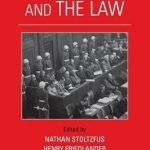
Nazi Crimes and the Law
Nathan Stoltzfus and Henry Friedlander
Book
This book examines the use of national and international law to prosecute Nazi crimes, the...
Heather Cranmer (2721 KP) created a post
Apr 16, 2021
Lenard (726 KP) rated The Auschwitz Report (2021) in Movies
Jan 27, 2021
People would say there are enough movies about the Holocaust, but this film is different. In 1944, two Slovak Jewish scribes escaped from Auschwitz to safety. They "worked" for the Nazis keeping careful records for the camp. When they met with the Resistance and with the Red Cross, neither organization could believe that the stories they told were true. Meanwhile, back in Auschwitz, the inmates at Barrack 9 withstood months of torture protecting the escapees.
A great movie overall. Two things stood out. One scene at the camp: After spending the night standing outside in the cold, Nazis force the captures to perform their daily work. As the captures walk off, three bodies are seen: one leaning against the wall of the barrack, one in a fetal position on the ground, and the last knelt over, a powerful image of torture. The second happens during the credits when voices from the modern day propagate hate against "the others" showing how the Holocaust continues even as some deny it.
A great movie overall. Two things stood out. One scene at the camp: After spending the night standing outside in the cold, Nazis force the captures to perform their daily work. As the captures walk off, three bodies are seen: one leaning against the wall of the barrack, one in a fetal position on the ground, and the last knelt over, a powerful image of torture. The second happens during the credits when voices from the modern day propagate hate against "the others" showing how the Holocaust continues even as some deny it.
Hara05 (11 KP) rated The Tattooist of Auschwitz in Books
Jun 30, 2019
Does not live up to the hype!
Since my interest in the Holocaust started at the tender age of 7, I have devoured any book on the Holocaust that I can get my hands on. Before release, The Tattoo Of Auschwitz was all over my newsfeed and I pre-ordered, excited for another book on the subject.
Boy, what I disappointed.
The premise of this book offered so much potential but from the first page, I found myself cringing. I haven't read a book so poorly written since the Fifty Shades fiasco and although I'm loathe to compare the two (one a poorly informed erotica and this one, a book on such a important and harrowing topic) I find that I cannot help it.
As I've said, the premise offered so much potential. A true story of the Holocaust from a little explored prospective which shines a light on the suffering of all those forced through the gates of Auschwitz and Birkenau, this book could have been something truly special, resonating with so many readers on so many levels. Instead, the reader must grapple through pages of unrealistic dialogue, clunky exchanges and at times, very simplistic prose which simply makes the reader bored. We must never be bored when it comes to The Holocaust - of anything, the horrific event should have us all squirming, almost in a sea of distress as we turn each page for how else can we learn from this? How can we take on board the lessons that must be learned when we cannot connect with the characters?
The fact that this is a true story just adds to the disappointment. So many survivors spent their lives too afraid or too completely isolated to ever want to share their experiences with the world and yet, here we have a brave survivor , willing to do just that and their story is completely ruined by awful story telling. Whether all of the survivors story is true or not is not the issue here, it's how the story has been presented and bundled up beneath an eye catching cover.
So bad is the writing, so terribly constructed is the prose, that I found myself forcing myself to finish. By the time I did read the final sentence, I was relieved. Not my usual relief of 'Thank God, they survived!' but instead, relieved that I had managed to get through it. By the time the end came, I still did not feel any connection to the main characters other than the sympathy that they were forced to live through that ordeal. Of course, I was routing for them but not because of anything included in the book rather because they were real human beings who found themselves in such a place.
What is so disappointing is the fact that, with all the media attention and advertising this book received, it could have been at the forefront of the movement to raise awareness of The Holocaust. With so many survivors now gone, most without having shared their own stories, this book could have really been something special. It could have educated masses of people and made us take a long, hard look at ourselves and the world around us.
Instead, it is only memorable it's disjointed prose and simplicity, when it's premise is anything but simple.
Boy, what I disappointed.
The premise of this book offered so much potential but from the first page, I found myself cringing. I haven't read a book so poorly written since the Fifty Shades fiasco and although I'm loathe to compare the two (one a poorly informed erotica and this one, a book on such a important and harrowing topic) I find that I cannot help it.
As I've said, the premise offered so much potential. A true story of the Holocaust from a little explored prospective which shines a light on the suffering of all those forced through the gates of Auschwitz and Birkenau, this book could have been something truly special, resonating with so many readers on so many levels. Instead, the reader must grapple through pages of unrealistic dialogue, clunky exchanges and at times, very simplistic prose which simply makes the reader bored. We must never be bored when it comes to The Holocaust - of anything, the horrific event should have us all squirming, almost in a sea of distress as we turn each page for how else can we learn from this? How can we take on board the lessons that must be learned when we cannot connect with the characters?
The fact that this is a true story just adds to the disappointment. So many survivors spent their lives too afraid or too completely isolated to ever want to share their experiences with the world and yet, here we have a brave survivor , willing to do just that and their story is completely ruined by awful story telling. Whether all of the survivors story is true or not is not the issue here, it's how the story has been presented and bundled up beneath an eye catching cover.
So bad is the writing, so terribly constructed is the prose, that I found myself forcing myself to finish. By the time I did read the final sentence, I was relieved. Not my usual relief of 'Thank God, they survived!' but instead, relieved that I had managed to get through it. By the time the end came, I still did not feel any connection to the main characters other than the sympathy that they were forced to live through that ordeal. Of course, I was routing for them but not because of anything included in the book rather because they were real human beings who found themselves in such a place.
What is so disappointing is the fact that, with all the media attention and advertising this book received, it could have been at the forefront of the movement to raise awareness of The Holocaust. With so many survivors now gone, most without having shared their own stories, this book could have really been something special. It could have educated masses of people and made us take a long, hard look at ourselves and the world around us.
Instead, it is only memorable it's disjointed prose and simplicity, when it's premise is anything but simple.
James Koppert (2698 KP) rated Maleficent: Mistress of Evil (2019) in Movies
Feb 21, 2020
Fantasy romp
Potentially I could be really critical of the movie and say how the plot is entirely predictable and done a hundred times before but does it claim to be unique? It's a family film which is a chi feast for the eyes and you switch your mind off and enjoy. I thought it a little strange of it's subtle holocaust mentions but anything that tries to teach unity is not a bad thing.

